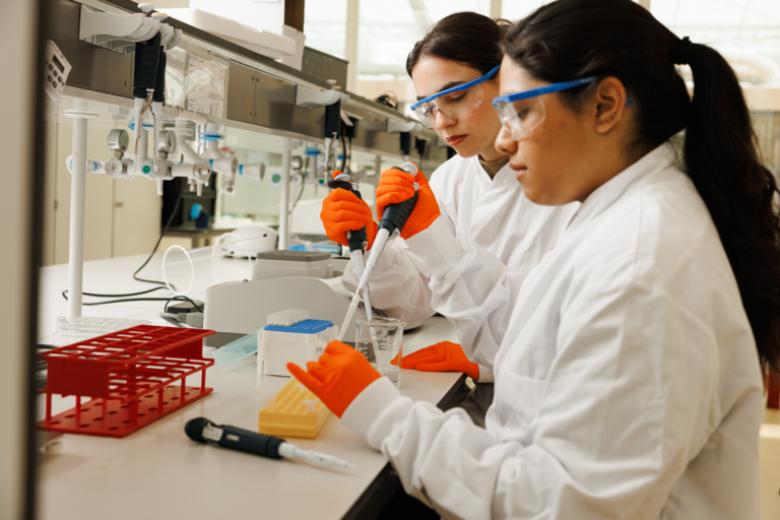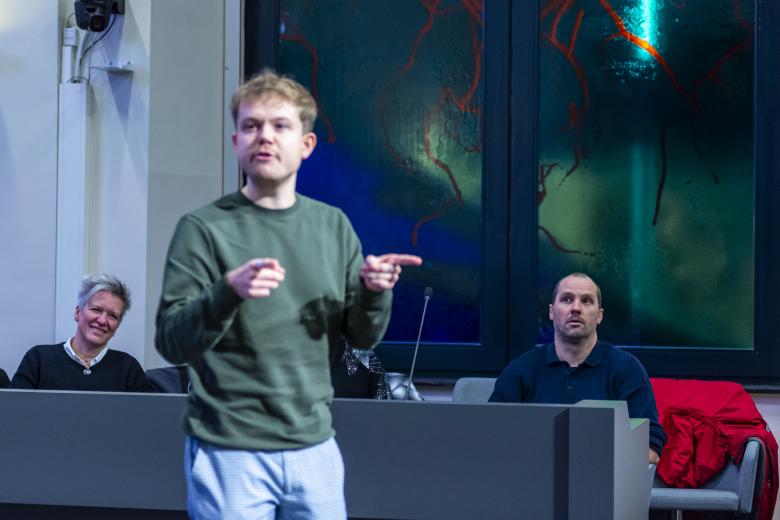Research at DKE: an important and permanent transfer of knowledge to a broader audience
Research conducted by the Department of Data Science and Knowledge Engineering (DKE) has been positively evaluated by an independent review committee, carried out by the Association of Universities in the Netherlands (VSNU). The review committee primarily focused at:
- Research quality
- Relevance to society
- Viability
"We are currently experiencing a fundamental transition from an information society to a knowledge society. We have lots of information around us and the key challenge is to make use of it"
Prof. Gerhard Weiss
Chair of the Department Data Science and Knowledge Engineering
Research quality
The department strives to produce excellent research in selected areas of artificial intelligence and of applied mathematics and operations research. DKE produces 6.28 unique peer-reviewed publications per research fte per year. The committee grades this productivity as good and appreciates the mix of output. The benchmark study shows that DKE’s research output is comparable to that of well-established research units in Europe.
The department does interesting and valuable research covering many research areas.
Visitation committee
Relevance to society
Also the KE@Work initiative (a special path in the DKE Honours programme to give students the possibility to get relevant work experience, to build up a professional network, to enhance their professional skills and to apply what they have learned in class to real life situations) was applauded by the committee since it brings promising opportunities to start or intensify research collaborations.
The published papers create an important and permanent transfer of knowledge to a broader audience as well as to other scientific domains such as: physiology, cardiology, neuroscience, biology and ecology.
Visitation committee
Viability
The visitation committee noted that DKE is well aware of possible threats and weaknesses. In light of this, it is recommended that DKE finds a balance between fundamental and applied research and between core research and service-related research.
The self-evaluation report states that DKE has the ambition to develop into an internationally visible and well-recognized centre of expertise in data science and knowledge engineering. The committee believes that there is a great potential to live up to this ambition.
Visitation committee
Final assessment
The Department of Data Science and Knowledge Engineering performs excellent research in selected areas of artificial intelligence, and of applied mathematics and operations research. They also play an active role in societal value creation, especially in neuroscience and in subfields of the biomedical domain such as cardiology and systems biology.
| Meaning | Research Quality | Relevance to Society | Viability |
|---|---|---|---|
| World leading/Excellent | The research unit has been shown to be one of the few most influential research groups in the world in its particular field |
The research unit makes an outstanding contribution to society | The research unit is excellently equipped for the future |
| Very good | The research unit conducts very good, internationally recognised research | The research unit makes a very good contribution to society | The research unit is very well equipped for the future |
| Good | The research unit conducts good research | The research unit makes a good contribution to society | The research unit makes responsible strategic decisions and is therefore well equipped for the future |
| Unsatisfactory | The research unit does not achieve satisfactory results in its field | The research unit does not make a satisfactory contribution to society | The research unit is not adequately equipped for the future |
The committee proceeded according to the Standard Evaluation Protocol (SEP). The final assessment is based on the documentation provided by the institute and the interviews with the management, a selection of researchers of the department, PhD students and external contacts of the department.
About DKE
Founded in 1992 as part of the Faculty of Humanities and Sciences, today the Department of Data Science and Knowledge Engineering (DKE) broadly covers Knowledge Engineering in research and teaching. DKE comprises three internationally respected research groups, having their focus on 'Robotics, Agents and Interaction', 'Networks and Strategic Optimization', and 'Biomathematics and Bioinformatics'. Education programs currently offered by DKE are Data Science and Knowledge Engineering (bachelor's programme), Artificial Intelligence and Data Science for Decision Making (master's programmes).
DKE’s Bachelor Data Science and Knowledge Engineering has been ranked no.1 and is awarded the seal of Top Quality Programme by Keuzegids Hoger Onderwijs for three consecutive years. With respect to both research and teaching DKE is engaged in various national and international cooperations.
Also read
-
Two new academic programmes launch in Venlo
Two programmes, one at Maastricht University and one jointly offered by the universities of Maastricht and Nijmegen, have been given the green light. Both tech and science-based programmes focus on a sustainable world and are part of the Faculty of Science and Engineering. The programmes will start...

-
UM student Natasha Lawrie studies the Bornean elephant: “I only had one week to find them”
Natasha Lawrie, a bachelor’s student from the Maastricht Science Programme, conducted her thesis research in the rainforests of Sabah. There she made surprising discoveries about the feeding habits of the endangered Bornean elephant.

-
More than another ‘to-do’: how the UTQ helped me rethink my teaching
At Maastricht University, the University Teaching Qualification (UTQ) is a professional development programme designed to strengthen teaching and learning. It supports teachers in developing core teaching competencies through a combination of workshops, peer learning, on-the-job experience, and...
